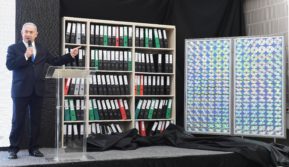
Israel and the US are working hard to counter Iran’s nuclear threat. Illustrative photo of Netanyahu discussing Iran’s “secret nuclear files”. Photo courtesy of: Amos Ben-Gershom (GPO)
The United States last week levied sanctions on a total of 31 persons and entities for their connections to an Iranian group believed to be a threat capable of re-launching Iran’s nuclear weapons program when the timing was right—and Israeli spycraft helped showcase that risk. The sanctions target those affiliated with Iran’s Organization for Defense Innovation and Research, known in Farsi by the acronym “SPND.” That entity, according to a background briefing from two US Senior Administration Officials published by the State Department, is headed by the founder of Iran’s nuclear weapons program, Mohsen Fakhrizadeh, and controls groups specializing in radiation, explosives, and missiles.
Israeli Prime Minister Benjamin Netanyahu, in comments released from his office on Saturday, congratulated US President Donald Trump and other key figures in the US Administration for the sanctions moves, which his office said came in the “wake” of Israel unveiling an Iranian nuclear program archive in 2018.
“Iran continues to deceive the international community and lie to the world about its military nuclear program,” said Netanyahu. “The Iranian regime continues to conceal its capabilities and to strive for nuclear weapons. Iran endangers the peace of the Middle East and the entire world and must be blocked.”
Last year, Israel revealed it had obtained a multitude of documents on Iran’s nuclear weapons program from inside Iran, and perhaps more important than what was in the documents is that the continued storage of the information by Iran showed a desire to retain nuclear weapons knowledge—not unlike the intent behind the SPND group sanctioned by the Americans.
“[SPND’s] continued existence highlights the problem of Iran continuing to try to maintain the option for itself of going back to its old way that we are obviously trying to prevent from occurring,” said the second of the US senior officials. “This is a danger that was highlighted by the so-called Iranian nuclear archive, which the Israelis rather daringly spirited out of Iran not too long ago, but is an extraordinarily important point to remember because the very squirreling away of all of those carefully preserved records from that program also goes to this point of reconstitution.
“And so what you have is essentially a regime that has been trying to prepare for itself what we might think of in the outside world as the perfect storm for [nuclear] proliferation breakout.”
That US official noted that the SPND threat goes hand-in-hand with a key problem in the Iran nuclear deal. The accord had a so-called “sunset clause” that would eventually permit Iran to increase its nuclear fuel enrichment program. As a result, the “breakout time” needed to develop nuclear weapons would have likely shortened to less than a year.
“Having that short breakout time for the material to produce a weapon, with people from SPND who have been waiting around and practicing their tasks, in effect waiting for the opportunity to put them back into service in a weapons program, just goes to the point of how critical it is to prevent that breakout time from shrinking,” said the official.
The American moves, therefore, are intended to make financial activities and travel more difficult for the SPND group, scare off companies who might want to do business with it, and discourage new experts from joining.
Said the first US senior administration official, “These are entities and people who continue to operate in Iran’s defense sector, which means that the intellectual firepower behind the [nuclear weapons] program very much continues to exist in Iran, and with this action, we’re exposing those people, those entities, and we are making them radioactive internationally.”
The US official called SPND “in a sense sort of the bureaucratic survivor and inheritor of that nuclear weapons program,” and noted that while it involves activities that can be used for civilian nuclear technology, “some of the projects and the types of work… do directly translate into weaponization work.”
SPND—and the continued involvement of Fakhrizadeh—was highlighted by Netanyahu in 2018 when he unveiled the Iran nuclear archive. On Friday, the second American official cited some US nuclear history from World War II to clarify the real danger posed by SPND.
“It’s as if some evil version of Robert Oppenheimer had been kept in charge of keeping the Manhattan Project crew together for years afterwards pretending that they were—or even legitimately working on other things but being very carefully kept together in order to be able to be called upon to get back to their original line of work [to build nuclear weapons],” said the official.
“That tells you what you need to know. This is not your run-of-the-mill defense organization; this is the reconstitution weapons program waiting for an opportunity to be restarted.”
(By Joshua Spurlock, www.themideastupdate.com, March 24, 2019)
